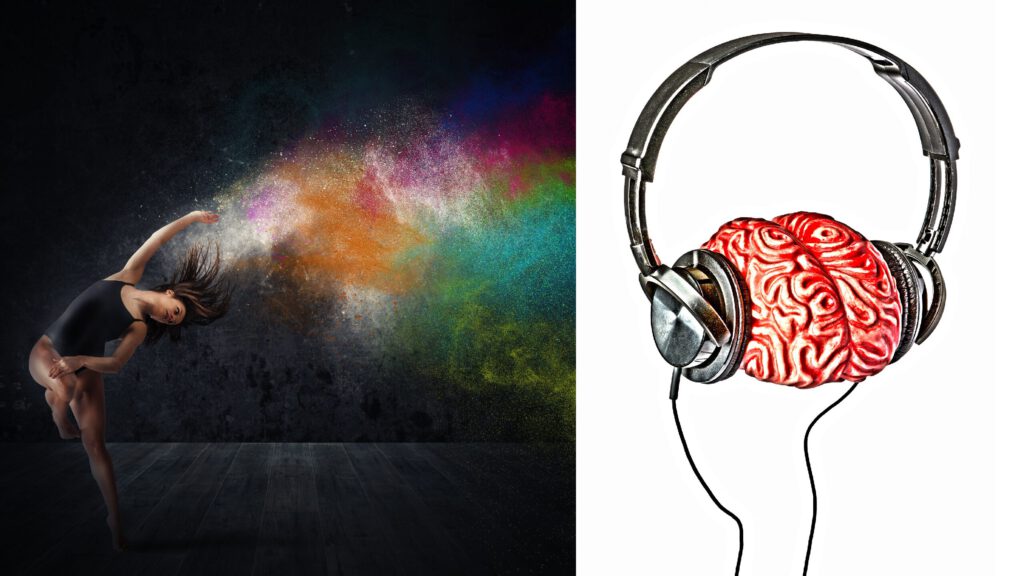I’ve got the music in me?

Recently, I went to a Mexican wedding and observed many young adults finally expressing their dance moves again on specifically loud and up-tempo music. Something we were not able to do in the last couple of months due to the strict covid-19 lockdown in the Netherlands. While my friends danced the night away, I noticed they all used different ways of expressing their dance moves. Almost every person moved more or less correctly to the expected beat. Solely three of them missed a beat once in a while. We all have that outlier friend. This suggests there are many individual differences in performing or expressing musical capabilities. It intrigued me a lot and therefore I started a discussion about this phenomenal mechanism of the multifaceted construct, musical capability, with the one standing close to me. The conversation started with music being incorporated in all of our lives – whenever we perform, dance or listen to music. While the hours passed by, we philosophized a bit more. How come music plays such an important part in all of our lives? Are we born with a set of “musical” genes or is practical experience the key to be a successful musical human being? And finally, why do we observe all these individual differences in experiencing and performing music?
How come music plays such an important part in our lives?
Whether we listen to music during a late-night run, move to music to reload ourselves after a hard-working week, or perform music at the annual Christmas party – we all include music into our daily lives in many different contexts. People say music is a universal form of expression in a way of telling a story wherein language can be limited, because words cannot always express the feelings that we experience. Research shows that music making, including joint singing and dancing, inspires children to keep a shared goal of moving or vocalizing together in time. Thereby, children may follow the intrinsic human need to share their emotions, experiences and moves through music with others in their social contexts. As such, music can bind human beings as some sort of form of social superglue. Additionally, do you know someone that has exactly the same music taste and did you notice this created an even deeper connection between the two of you? Not just simultaneously music making but sharing similar music tastes can lead to better social interactions. All plausible reasons why we all love to perform, dance or listen to music – right? If we all love music that much, how come we observe variability in musical capability among individuals?
Musical genes and practical experience
Back to the Mexican wedding party… I noticed mainly one big difference between the rest of the dancing people and myself: loose hips all over the place. With the particular salsa footsteps, men and women easily adapted their dance moves to different musical styles. It seems that there was a culture difference going on. I wondered, are these people born with these incredible dance moves? Twin studies revealed that a big part of rhythmic ability is influenced by genetic factors. Subsequently, this heritability effect also influences the willingness to practice. Thus, these findings suggest that even these additional factors, on top of musical talent, are driven by genetic factors. How does this work? Let me give you an example: the smooth dance moves I observed at the wedding were possibly substantially influenced by some rhythmic genes that the people were born with. However, the moves would not be flourished into excellent ones if they would never practice at birthday parties at an early age. Herewith, I want to mention another possible reason why individual differences can be observed in musical capability. Age of onset of musical training in sensitive windows of brain development during childhood – a period where a child is more susceptible to environmental effects – is also suggested to be a source of individual variability in musical skill development. Does this topic open the doors for neuroscientist to better understand brain plasticity? Yes.
Musical brain
We already know that music can support well-being by creating deeper social interactions, can improve the life quality by coloring our experiences with emotions, and can stimulate cognitive functions and learning (in math and language skills for example). But how come? Well, because a great part of our brain regions and brain networks are involved when we perform, dance or listen to music. Important networks related to well-being, learning and motor skills are the important affective and motor networks. When these are often activated by music this can help to keep the numerous brain pathways between these networks strong. How often we stimulate the brain networks depends on how often we practically experience music. Therefore, individual differences in brain development can possibly occur through variances in practical experiences over the years. Subsequently, this can lead to individual differences in musical capability. Maybe, this explains why we all have that nonrhythmic friend on the dancefloor?
To better understand the relation between individual differences in brain developmental patterns and musical capability – particularly during a sensitive window in childhood – I will investigate this topic that even fascinated me on the dancefloor of a Mexican wedding. With the unique twin-study design of Leiden Consortium on Individual Development (L-CID) we can explore this multidisciplinary question of music and brain developmental patterns in more detail. Stay tuned on what I will discover soon!
Contact
Erasmus University Rotterdam
Mandeville Building T13
Burgemeester Oudlaan 50
3062 PA Rotterdam, the Netherlands

